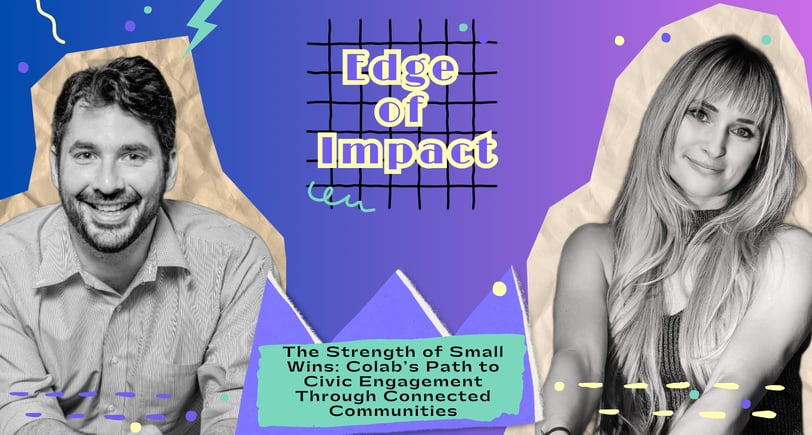#11 The Strength of Small Wins: Colab’s Path to Civic Engagement Through Connected Communities
Discover how Colab transformed civic engagement by turning small citizen actions into powerful community solutions. Born from the streets of Brazil’s 2013 protests, this innovative platform empowers millions to shape their cities through transparent, tech-driven participation. In this episode, we explore Colab’s journey to strengthen democracy, one pothole, vaccination, and budget vote at a time. Join us to learn how technology can amplify voices and build connected communities for lasting impact.
PODCAST
Odeta Ise
5/8/20255 min read


Let's dive into the Insight, Inspiration & Impact behind Colab with Gustavo Maia
Follow & Support Colab
WSA Winning Year: 2014
Award: The World Summit Award
Category: Government & Citizen Engagement
Founders: Mr. Gustavo Maia
Country: Brazil
On WSA website: https://wsa-global.org/winner/colab-re/
In 2012, Gustavo Maia, a seasoned entrepreneur with a sharp eye for opportunity, found himself immersed in the energy of Brazil’s political campaigns. Social media was emerging as a powerful tool for public engagement, and Gustavo observed a profound shift: citizens were not just browsing Facebook, they were eager to influence the decisions shaping their communities. This insight, sparked by the dynamism of Brazil’s first social media-driven elections, inspired Gustavo to create Colab, a platform designed to connect citizens with their governments. What began as a vision to amplify voices has grown into a vital tool for civic participation, demonstrating how technology can enhance democracy when guided by a commitment to meaningful change.
The Spark of Inspiration
Gustavo’s entrepreneurial journey predates Colab. With a degree in social communications and a history of ventures in advertising, digital marketing, and even construction, he had always been driven to build. However, his work in political campaigns in 2012 revealed a deeper truth about Brazil’s public life. During those elections, he saw citizens using social media to express frustrations and demand a role in shaping their cities. Simultaneously, he met politicians, many genuinely dedicated to public service, who struggled to engage with their constituents effectively.
This intersection of citizen enthusiasm and public sector potential was Gustavo’s defining moment. He realized, “People really want to participate in the decision-making process,” and social media offered a way to make that possible. The challenge was not just amplifying voices but creating a system where those voices could lead to tangible solutions. Joined by his college friend and long-time business partner, Gustavo set out to build Colab, a platform to bridge the gap between citizens and governments, turning ideas into policies and complaints into action.
From Insight to Action
Colab launched in 2013, and its early days were marked by both success and challenges. Just three months after its debut, the platform won a global award for the best urban app, affirming its potential to transform civic engagement. The timing was significant. In June 2013, Brazil saw widespread protests, with citizens taking to the streets to demand better governance. Colab’s mission to foster dialogue and problem-solving through technology became more urgent than ever.
The path forward was not straightforward. Initially, Colab was more of a tool than a sustainable business, lacking a clear revenue model. Gustavo and his team secured early investment from a Brazilian fund, but convincing governments to adopt their platform proved difficult. “We didn’t have a business model yet, but we knew we wanted to sell to governments while helping people,” Gustavo recalls. Their first breakthrough came by offering the platform for free to over 100 municipalities, proving its value but straining their resources. It was not until 2014 that they secured their first paying client, marking the start of a gradual journey toward financial stability.
Values That Drive Impact
Colab’s journey is rooted in core values: transparency, empowerment, and a deep belief in democracy. Unlike tech companies focused solely on profit, Colab’s mission is to make governments more responsive and citizens more engaged. Gustavo did not initially set out to create a social impact business; he admits he was unfamiliar with the concept in 2013. As Colab grew, however, he came to appreciate the profound difference it could make.
This shift is evident in Colab’s evolution from a simple app for reporting potholes to a comprehensive digital services platform. Today, Colab supports a range of services, from scheduling doctor’s appointments to participatory budgeting, where citizens decide how public funds are allocated. With over one million registered users and 20 municipal clients serving a combined population of 10 million, Colab has resolved nearly 500,000 urban issues and helped 200,000 people access vaccinations during the pandemic. Everyday stories, like a security guard using Colab to report broken streetlights for safer commutes, weave together into a broader tapestry of empowerment and accountability.
Gustavo’s commitment to democracy shapes every facet of Colab’s work. The platform uses blockchain to ensure the integrity of participatory budgeting votes and validates user identities to prevent fraud, establishing trust in the decision-making process. “We’re trying to be as real as an election,” Gustavo explains, emphasizing the importance of a platform that strengthens democratic processes. This commitment extends to Colab’s partnerships with governments, where it provides methodologies and training to help public servants manage their cities more effectively.
Overcoming Challenges, Dreaming Big
Colab’s growth has faced significant hurdles. Selling to governments in Brazil involves navigating complex bureaucratic and political landscapes. “It’s not like the private sector,” Gustavo notes. “A mayor might love our platform, but they only have 15 percent of the decision-making power.” Public procurement processes often favor companies willing to manipulate bids, a practice Gustavo refuses to engage in. This integrity, while principled, slows growth and presents ongoing challenges.
Despite these obstacles, Gustavo’s vision remains ambitious. He aspires to scale Colab not only across Brazil but globally, bringing its model of citizen-government collaboration to countries like Indonesia, where similar democratic and technological conditions exist. “I want to make this huge,” he says, driven not by personal gain but by the potential for widespread impact. He envisions a future where Colab’s platform is a cornerstone of digital governance, enabling cities to deliver services efficiently and transparently while empowering citizens to shape their communities.
A Legacy of Inspiration
Gustavo Maia’s journey with Colab illustrates the power of inspiration leading to insight and, ultimately, impact. What began as an observation during Brazil’s social media-driven campaigns has grown into a platform that empowers millions, addresses real-world challenges, and strengthens democracy. Through it all, Gustavo’s values of transparency, empowerment, and dedication to public good have remained steadfast.
For those seeking to create change, Gustavo’s story offers a compelling lesson: progress begins with listening. By understanding the needs of citizens and the challenges faced by public servants, Colab has shown that technology can serve as a force for good when it prioritizes people over profit. As Gustavo continues to pursue a bigger, bolder Colab, his work reminds us that the future of democracy lies in the everyday act of giving people a voice and ensuring it leads to action.










